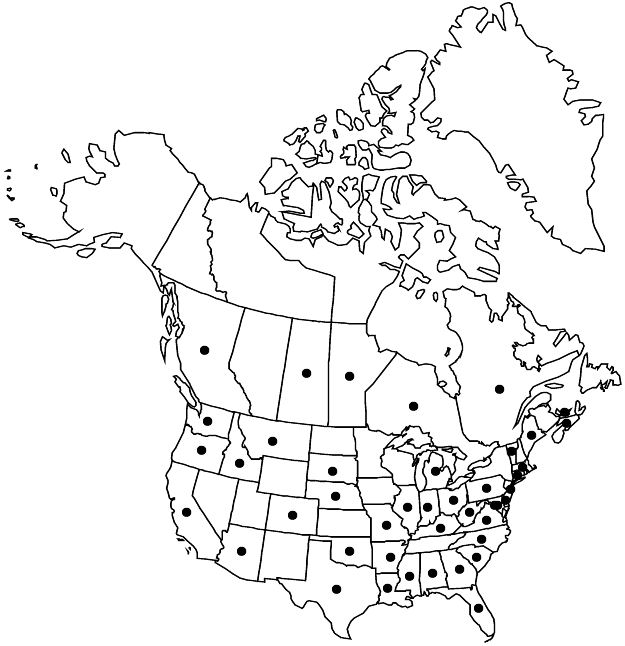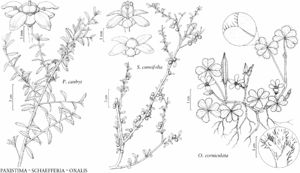Oxalis corniculata
Sp. Pl. 1: 435. 1753.
Herbs annual, caulescent, rhizomes and stolons absent, bulbs absent. Aerial stems commonly 2–8 from base, prostrate or decumbent, stolonlike, rooting at nodes, 4–10 (–30) cm, herbaceous, sparsely and loosely strigose to strigose-villous or villous, hairs nonseptate. Leaves basal and cauline; stipules oblong, membranous, margins with wide, free flanges, apical auricles free; petiole 1–5 cm; leaflets 3, green or bronze-purple to maroon, obcordate, (4–) 6–12 mm, lobed 1/5–1/3 length, margins often prominently villous-ciliate, surfaces glabrous, oxalate deposits absent. Inflorescences irregular or umbelliform cymes, 1–3 (–6) -flowered; peduncles (1–) 2–4 (–8) cm. Flowers mostly homostylous; sepal apices without tubercles; petals yellow, 4–8 mm. Capsules angular-cylindric, gradually or abruptly tapering to apex, 8–17 (–20) mm, sparsely puberulent to glabrate or glabrous. Seeds brown, transverse ridges brown. 2n = 24, 36, 42, 44, 48.
Phenology: Flowering Mar–Aug(–Oct), sporadically year-round.
Habitat: Disturbed areas, gardens, greenhouses, lawns, fields, roadsides, hammocks, beach margins, open pine woods, grasslands.
Elevation: 10–500(–2500) m.
Distribution

Introduced; B.C., Man., Ont., N.S., P.E.I., Que., Sask., Ala., Ariz., Ark., Calif., Colo., Conn., Del., D.C., Fla., Ga., Idaho, Ill., Ind., Ky., La., Maine, Md., Mass., Mich., Miss., Mo., Mont., Nebr., N.J., N.C., Ohio, Okla., Oreg., Pa., S.C., S.Dak., Tex., Vt., Va., Wash., W.Va., Mexico, West Indies, Central America, South America, also in Europe, Asia (China), Asia (India), Asia (Japan), Africa, Pacific Islands, Australia
Discussion
Oxalis corniculata in the flora area is recognized by a combination of its small flowers (petals yellow, 4–8 mm); sparsely hairy, herbaceous stems creeping and rooting at nodes; and stipules with free flanges and apical auricles. Peduncles and leaves (one to three) are produced at the nodes, short erect stems less commonly so. Specimens have been seen documenting its distribution in the United States as listed above; it may also occur in intervening areas.
The typical form of Oxalis corniculata is strictly annual with consistently herbaceous, prostrate stems. At least some populations in western Oregon are distinctly more erect, with decumbent-ascending stems, than those of the eastern United States. In contrast, stems of O. dillenii characteristically are initially erect but may become decumbent to prostrate, occasionally rooting at the nodes; they almost always become more or less woody. Stems arising from nodes of laterally oriented stems characteristically are erect. In most of the United States, O. corniculata usually occurs in urban and highly disturbed habitats, but along the Gulf Coast it occasionally grows in less obviously disturbed sites and might be native there. However, assignment of nativity awaits a clearer understanding of patterns of variation within what is recognized as a highly variable species.
Variants of Oxalis corniculata and closely similar forms occur in Mexico, the West Indies, Central America, and South America, as well as in other parts of the world, including the flora area. Plants with bronze-purple to maroon leaves and hairy capsules have been recognized as var. atropurpurea (for example, in Florida, D. B. Ward 2004; in California, L. Abrams and R. S. Ferris 1923–1960, vol. 3). Variety atropurpurea in Malaysia has features of a distinct species, differing from typical O. corniculata in karyotype as well as in floral and vegetative morphology and is isolated by post-pollination reproductive barriers (B. R. Nair and P. Kuriachan 2004). Australasian variants sometimes identified as O. corniculata recently have been treated at specific rank (for example, P. J. de Lange et al. 2005). In view of the significant variation in ploidy level reported for the species, formal recognition of these and probably still other segregates may be justified.
Selected References
Lower Taxa
"alternating" is not a number."wide" is not a number."/5" is not declared as a valid unit of measurement for this property.
